What are Helping Verbs?
Helping verbs are words that accompany the main verb in a sentence to form a complete verb phrase. They do not stand alone but work with the main verb to indicate the time, mood, or voice of the action. Common helping verbs include am, is, are, was, were, have, has, had, will, shall, do, does, and did.
Types of Helping Verbs
- Primary Helping Verbs
- Modal Helping Verbs
- Marginal Helping Verbs
Primary Helping Verb
Primary helping verbs include be, have, and do. They help to form various verb tenses and voices.
Forms of “Be”
The verb “be” changes form depending on the tense and subject. It’s used to create continuous tenses and passive voice.
| Form | Usage Example |
|---|---|
| am | I am reading a book. |
| is | She is cooking dinner. |
| are | They are playing soccer. |
| was | He was studying yesterday. |
| were | We were watching a movie. |
Forms of “Have”
The verb “have” helps to form perfect tenses.
| Form | Usage Example |
|---|---|
| have | I have finished my homework. |
| has | She has gone to the market. |
| had | They had left before I arrived. |
Forms of “Do”
The verb “do” is used to form questions and negatives, especially in simple tenses.
| Form | Usage Example |
|---|---|
| do | Do you like pizza? |
| does | Does he work here? |
| did | Did they call you? |
Modal Helping Verb
Modal helping verbs express ability, possibility, permission, or obligation. These include can, could, may, might, must, shall, should, will, would.
| Modal Verb | Function | Usage Example |
|---|---|---|
| can | Ability | She can speak three languages. |
| could | Past Ability | He could run fast when young. |
| may | Permission | May I borrow your book? |
| might | Possibility | It might rain today. |
| must | Obligation | You must finish your work. |
| shall | Future Action | I shall return soon. |
| should | Advice | You should eat healthily. |
| will | Future Intention | We will visit you tomorrow. |
| would | Conditional | I would help if I could. |
Types of Helping Verbs
- Primary Helping Verbs: Be, Have, Do
- Used to form different tenses and passive voice.
- Modal Helping Verbs: Can, Could, May, Might, Must, Shall, Should, Will, Would
- Used to express ability, possibility, necessity, and more.
Using Helping Verbs Correctly
Subject-Verb Agreement
When using helping verbs, ensure that they agree with the subject in number and tense. For example:
- He is going to the store. (Correct)
- He is going to the store. (Incorrect)
Forming Questions and Negatives
Helping verbs are essential in forming questions and negatives. For instance:
- Do you like apples? (Question)
- She does not want to go. (Negative)
Example Sentences of Helping Verb
- I am reading a book.
- She is going to the store.
- They are playing in the park.
- He was watching TV last night.
- We were cooking dinner together.
- I have finished my homework.
- She has seen that movie before.
- They have been studying for hours.
- He had left when I arrived.
- We had already eaten by then.
- I will call you later.
- She will be here soon.
- They will have completed the project by tomorrow.
- He is not coming to the party.
- We are going to start now.
- I was thinking about you.
- She has been feeling better.
- They have gone to the beach.
- He will have dinner ready by 7 PM.
- I am not sure about the answer.
Conclusion
Understanding and using helping verbs correctly is fundamental for constructing clear and grammatically accurate sentences. They help in forming questions, negatives, tenses, and voices, making them indispensable in English grammar. By mastering the use of helping verbs, ESL students can improve their communication skills and perform better in exams. Keep practicing, and soon you’ll find using helping verbs second nature!

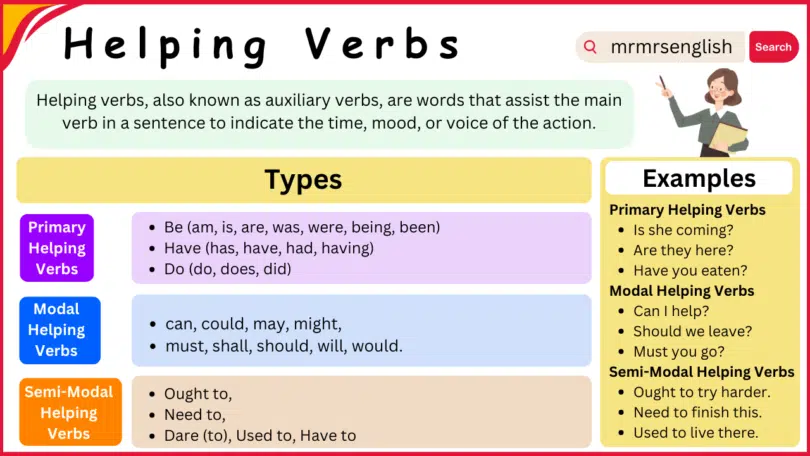


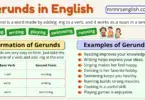
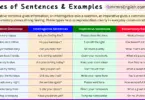
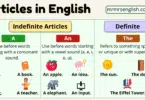
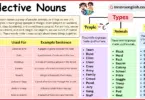
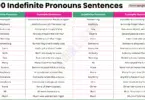
Leave a Comment